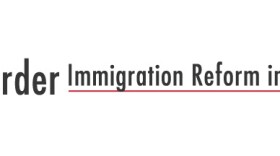When Congress takes up immigration reform in the next few weeks, two lawmakers from Arizona will have a big hand in shaping the debate.
Republicans John McCain and Jeff Flake are part of the so-called Gang of Eight, a bipartisan group in the Senate that’s hammering out a proposal.
In a way, it’s obvious why one-quarter of the Gang hails from Arizona. Back in 2010, protests over the state’s immigration law, SB 1070, made Arizona a poster child for the anger felt on both sides over failed policies in Washington.
Now, the 113th Congress will try again.
“I think we have to have a bigger tent, no doubt about it” McCain said recently on Fox News. “Obviously, we have to do immigration reform. And there is no doubt whatsoever that the demographics are not on our side and we are going to have to give a much more positive agenda.”
McCain was referring to the Republican Party’s poor showing among Latinos in the 2012 election. But this is not the first time the Arizona senator has grappled with immigration reform.
In 2005, he rolled out a plan with Sen. Ted Kennedy that included boosting border security and a route to permanent status for millions of illegal immigrants. It failed, and as political winds shifted in the coming years, McCain’s stance moved in support of stricter immigration enforcement.
“Probably out of that Gang of Eight, he has the potential to be the most influential senator," said Arizona State University political analyst Bruce Merrill, who cited McCain’s tenure in Congress and his long history with the issue.
Merrill added that McCain can, and should, support the most contentious issue at the heart of immigration reform: a path to citizenship. With so many undocumented immigrants living in the United States, Merrill said there isn’t any other reasonable solution.
“What do you do? Round up 10 to 12 million people and herd them across the border?”
So, inevitably, Congress must deal with the question of amnesty.
The most junior member of the Gang of Eight, Sen. Jeff Flake, said this will be a big sticking point between the parties.
“To some it smacks of amnesty if you’re not deporting everyone who is here is illegally,” he explained. “If you give any path or any way to adjust your status short of going to your home country for 10 years, some people will classify that as amnesty. I don’t.”
Flake is advocating for hefty fines and background checks before illegal immigrants can get a provisional work visa. Anyone who came here illegally needs to get behind those who sought citizenship the right way, he said.
Flake added: “It’s a long, arduous path. But it wouldn’t be an amnesty, because you’re not cutting in line.”
In an interview, Flake described his personal history growing up in a border state working on a farm alongside Mexican migrants. This helped him understand the complexity of the problem.
He was never able to look at the people working along side him and think of them as criminals, “although many did not have legal status,” Flake said.
“They were coming in large measure just to feed their families and to have a better life. So I have always thought we need a solution to this problem, one that deals with it humanely.”
Rep. Luis Gutierrez, a Democrat from Illinois, said having McCain and Flake in the Senate working on this issue will be good for the debate.
“I can’t think of a better state to have two republicans working on this,” said Gutierrez, who co-sponsored an immigration bill with then-Representative Flake in 2007. “Before SB 1070 they were for comprehensive immigration reform and they worked with Republicans to get it done. And now they are working once again.”
The president is expected to release his plan for immigration reform later this month.







